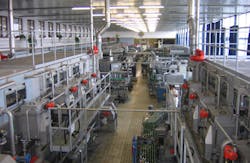One of the United States’ largest juice processors and marketers buys fresh-fruit juice from partners and suppliers and turns it into beverages sold around the world. The company produces orange juice at a 720,000 square-foot processing plant in central Florida. The plant was recently expanded. A new production line for one of its fastest-growing brands and a storage "tank farm" were installed and telecommunications, information technology and other systems upgraded.
Between the juice processing plant’s original legacy equipment and demands created by the expansion, the plant had a range of divergent needs: excellent non-solids dewatering performance for stormwater runoff, corrosion-resistance and solids-handling capabilities for acidic wastewater and process water and high-temperature resistance coupled with solids handling for bottle washing.
In early 2010 the company purchased two BJM Pumps SX15CSS stainless-steel, non-clog pumps from Barney’s Pumps of Coral Springs, Florida. These two-horsepower pumps — which have stainless-steel impellers, wear plates, oil housings, pump housings and inner pump tops to resist corrosion and can pass two-inch-diameter solids — performed well in handling the plant’s large volume of slightly acidic, pulpy process and wastewater. Based on that success, the company’s consulting engineer specified BJM pumps for use in all of the company’s plants.
About a year after the SX pumps were installed, the central Florida processing plant bought for its bottle-washing sump two BJM S75CF, high-temperature, non-clog "Fahrenheit" pumps. These 10-horsepower, cast-iron pumps can pass 2½’ solids and are engineered to withstand the heat of liquids that are as hot as 200 degrees Fahrenheit; these pumps, too, have performed flawlessly.
Finally, in early 2012 the plant ordered two 7½-horsepower stainless-steel pumps, model JX55CSS, for a large, new sump built to handle the extra process water and storm-water runoff generated by the 20 percent expansion in the size of the facility. JX pumps are designed for general pumping purposes where the passage or shredding of sizeable solids is not required. The pumps were shipped within two weeks of being ordered; they were installed on rail assemblies within the sump, and the whole system was started up in March. The pumps are excelling at their work, and the company has placed subsequent orders for BJM pumps at other facilities around the country.
